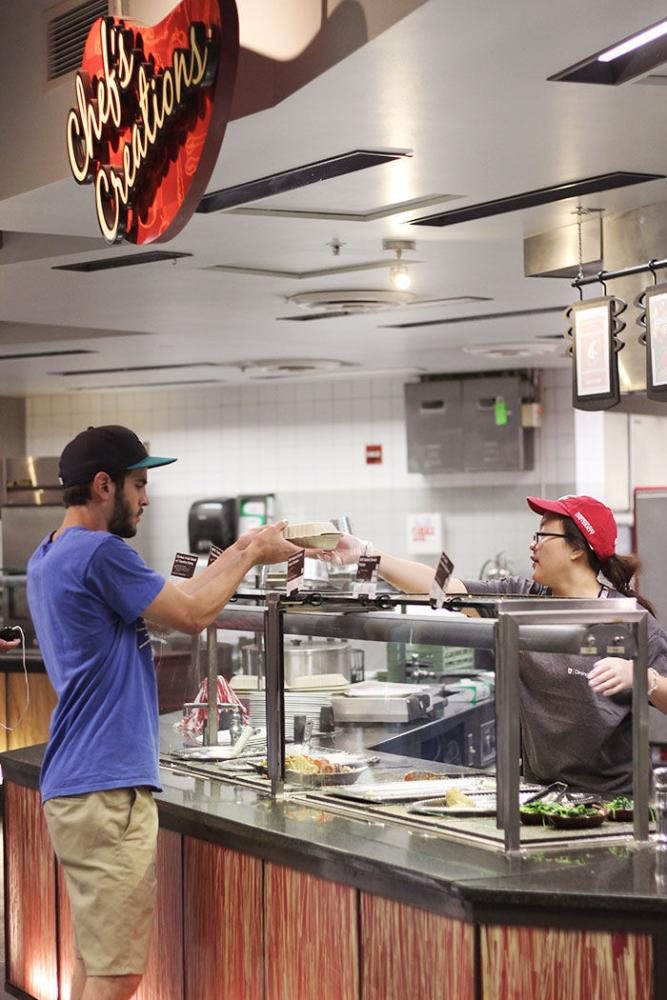More meatless food options will increase diversity
Dining halls have recently begun to provide more meatless meal options for vegan and vegetarian students.
November 28, 2016
{{tncms-asset app=”editorial” id=”9153f852-b519-11e6-9937-cf6675724f68″}}
College is a time for exploration in all aspects of our lives, and that includes food.
When a student wants to go vegetarian, vegan, or improve their diet in general, it is a challenge many on WSU’s campus don’t want to take part in.
A diet and lifestyle such as vegetarianism and veganism should be easy for all college students to pursue during their time on campus without the current limitations on food options.
For students who are not freshmen and do not have a Residence Dining Account (RDA) that gets them the best deals in the dining halls, they stand at a disadvantage when it comes to choosing their meals.
The dining halls have been increasingly incorporating vegetarian, vegan and allergy-free options while clearly labeling them to meet student demands. Aside from the dining halls, however, selections are insufficient.
From experience, it is much easier to follow a vegetarian diet than a vegan one on campus, but you’re still left with minimal options.
In an article with The Huffington Post, Kathy Stevens wrote that she predicts America will be vegan by 2050. In 2012, Americans consumed 12.2 percent less meat than in 2007, Stevens wrote. Meatless lifestyles are a fast-growing trend in America and universities should follow along.
Animal consumption affects the earth in a negative way just as much as it does to our own bodies.
Ever since I read “Don’t Eat This Book: Fast Food and the Supersizing of America” by Morgan Spurlock in sixth grade, it sparked my fascination for food and its effect on our body.
I grew up in a town that has plenty of wholesome and nourishing food options, so coming to WSU was a shock and a forced transition.
During my second year, I discovered VegWSU, a club that promotes awareness about the benefits of eating vegetarian or vegan and offers support and a community to those who want to learn more about a plant-based diet.
After participating in one club meeting, I was prompted to try out a vegan diet for a month, and I learned a lot in a short amount of time about life as a vegan on our campus.
I met with WSU’s dietician, Alice Ma, who lives a vegan lifestyle, and she helped gather multiple resources to assist me during the month.
There is a whole world of vegan food at the grocery store, and I realized there are plenty of vegan foods that just don’t exist on campus. While there are markets available near dining halls, their options for produce are limited.
There are also meals that could easily be turned into a vegan dish if one of two things were excluded, such as meat in chili or using vegetable stock instead of a meat-based stock.
Eating more rejuvenating, natural food can help increase focus, motivation and give an overall energy-boost to conquer schoolwork and your daily activities.
It is easier for a student living outside the dining halls to pack their own personalized lunches and snacks, but what happens when vegan students forget to pack one or haven’t had time to hit the grocery store?
They have no choice but to eat on campus and, like most college students, they’re not always able to spend a fortune in the dining halls.
There are numerous advantages to going vegan, such as health, environmental sustainability and saving animal lives from abuse.
Robin Raven of The Huffington Post wrote that the overuse of antibiotics in animal products and the polluted water and land caused by livestock production is detrimental to human health.
“This livestock production, which includes eggs and dairy, takes up more than a third of the fresh water in the world,” Raven stated. “At least 18 percent of the world’s greenhouse gas emissions come from livestock. That’s more than the combined emissions from all forms of human transportation.”
Pursuing a vegan diet on WSU’s campus should not be this much of a challenge. If anything, the university should be promoting a healthier diet among students who pull frequent all-nighters and rely on massive amounts of coffee and energy drinks to get through the day.
In order for our institution to increase its diversity, it is important to consider the students interested in eating vegan for whatever reason they decide.
For people who don’t want to completely change the way they eat, even just going vegetarian or vegan for a meal makes an impact.
If WSU integrated a larger variety of fresh and raw food readily available on all parts of campus, it would not only fulfill many student desires, but it would allow us to make a statement, choose our way of life and contribute to saving the earth.






















